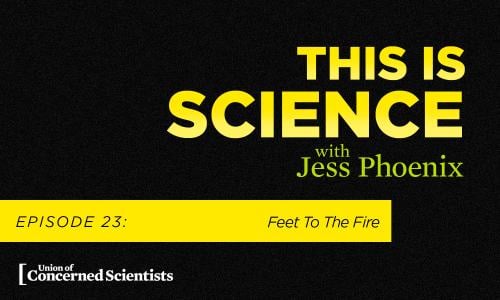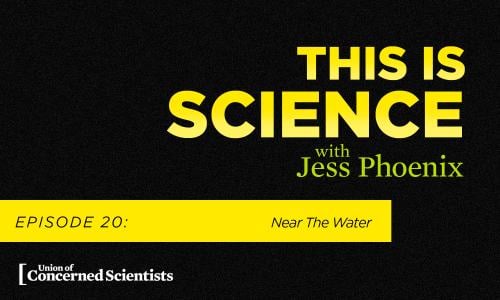Arctic expert Joel Clement is back with an update on federal science in the region, and how Alaska Natives are adapting to the changing landscape.
In this episode
Colleen and Joel discuss:
- the current state of the landscape in the Arctic region
- the disastrous melting of permafrost
- reinvigorating the Arctic Research Commission and bringing science back into the fold
Timing and cues
Opener (0:00-0:32)
Intro (0:32-2:16)
Interview p1 (2:16-13:35)
Break (13:35-15:01)
Interview p2 (15:01-23:50)
Throw (23:50 - 24:01)
Segment (24:01 - 27:32)
Outro (27:32-29:00)
Credits
Sidelining Science segment: Shreya Durvasula
Editing: Colleen MacDonald
Additional editing and music: Brian Middleton
Research and writing: Pamela Worth
Executive producer: Rich Hayes
Host: Colleen MacDonald
Related content
Full transcript
COLLEEN: My guest today is Joel Clement, who for many years worked at the Department of Interior connecting Alaska Native people with resources to help them adapt to the rapidly changing climate in the Arctic. If you’re a regular listener, you know that in 2018 Joel was transferred to a totally unrelated department by political appointees of then President Trump, who didn’t want people talking about climate change. . Joel blew the whistle on the administration for reassigning him, and then got out of dodge.
Today Joel is back to talk about some of the big issues happening in that big region at the top of the globe, like how climate change is affecting people who live in the Arctic and how melting permafrost creates figurative and literal instability. While that may make us shiver, there’s some good news, too—including some important changes at the Arctic Research Commission, a federal agency that provides research and advise to Congress and the president.
Joel has been Senior Fellow in our Center for Science and Democracy since he left government, and he’s also a Senior Fellow at the Harvard Kennedy School Belfer Center for Science and International Affairs.
Before we get started, a quick note on language. Joel refers consistently to the Indigenous Alaskans he used to serve at the Department of the Interior… as Alaska Natives. He also uses the term American Indians one time, which is a name that many indigenous folks in the US use to describe themselves. If you are not an Indigenous person, and you’re wondering how to refer to Indigenous people in your life, it’s a good idea to ask what they prefer.
Colleen: Joel, welcome to the podcast.
Joel: Hi, Colleen. Thanks. It's great to be here.
Colleen: Yeah. I mean, it's been a while since we've talked and there's a new administration, a new head of the Department of the Interior, Deb Haaland, who also happens to be the first Native American to be a cabinet secretary. You must be extremely pleased with this appointment.
Joel: Oh, just thrilled. That's so emblematic of the change we're experiencing right now in the federal government. Deb Haaland is a great leader. She knows what she's doing, but also to have a Native American leading the Interior Department, the agency that was known for its dark history with American Indians throughout the 19th century, it's really fantastic and I think very invigorating for the hundreds of tribes around the country who now feel that for the first time, they've been represented at a high level in the president's cabinet. And that that is absolutely momentous. So very exciting.
Colleen: In addition to that, we have other good news to talk about out today with the reformation of the Arctic Research Commission. But before we get to that, can you set the scene for us? The Arctic is changing rapidly due to climate change. Remind us why this specific area of the world is so important.
Joel: Yeah. So the Arctic incidentally is warming about three times now faster than the rest of the planet. We used to say twice as fast. It's gone up quite a bit. some have used metaphors like the Arctic is the air conditioning for the planet and so on, which is not entirely accurate, but it is an essential area for life on Earth. And not just storing ice and all that water that's locked up in ice up there, but also regulating atmospheric circulation patterns and, of course, there are 4 million people who live in the Arctic who are very concerned about climate change. So the region... I didn't even mention the geopolitical implications of this new ocean that's emerging as the sea ice melts away.
Colleen: So who are the countries that have a stake in the Arctic region?
Joel: Well, the eight Arctic states as recognized within the Arctic Council, which is the intergovernmental body that they belong to are the U.S. and Canada, Denmark on behalf of Greenland. Russia, of course, is a huge slice of the Arctic. And then the Nordic countries, Iceland, Norway, Sweden, and Finland, all of them very deeply engaged in Arctic issues. But these days because of the shipping opportunities through the Arctic and some energy issues, we have a lot more Chinese representatives, Korean representatives in our Arctic Council meetings. We have, more and more countries have become observers to the Arctic Council because of all of these opportunities. I've had a lot of conversations lately with Indian diplomats. India is very interested in some of the opportunities up there. So in terms of the geopolitics of the region, it's becoming more and more interesting to these folks.
Colleen: So Russia has the longest coastline. What are they thinking about this region?
Joel: For Russia, the Arctic is essentially a bold new coast for them. They have three or four rivers, the size of the Mississippi that flow into the Arctic. So to them, this is an opportunity for trade that they've never seen before. So that's changing the dynamics among the eight Arctic countries, but also worldwide when you talk about shipping shortcuts through the Arctic and so on. I mean, the economic implications are also enormous. So the Arctic, as it emerges from under the ice, unfortunately, is playing a huge role both in terms of geopolitical and economic conditions on the planet, but also, of course, sea-level rise and atmospheric circulation. So it really is a major planetary regulator that is right now in disruption.
Colleen: What are the most significant changes that are happening due to climate change?
Joel: Well, we often hear about the way the sea ice is melting and opening up this ocean. But in addition to that, we have immense and rapidly accelerating melts of the ice caps, and particularly in Greenland. We've had a few incidents over the last two summers where the melt rate has exceeded all records, and the amounts of water, freshwater that's being melted out into the ocean is stunning. In one day, enough to cover a Florida in a couple of feet of water, right? I mean, it's just remarkable how that's happening. So the melting of the ice I'd say is the number one thing, but the one that people don't talk about as much is the thawing of the permafrost.
And some 25% of the Northern Hemisphere is on permafrost, and these are partially are entirely frozen soils. And as this stuff thaws, every bit of infrastructure that's been built in the Arctic is threatened, and that includes about 80% of the natural gas infrastructure in Russia, for example. It includes our Trans-Alaska Pipeline and all the roads that service that. It includes villages and communities that are perched right on the edge of Arctic seas and no longer protected by sea ice. So the ground is melting from beneath their feet. So these are some of the trends that we are really paying close attention to. And, of course, now hearing about wildfire in the Arctic, which we never used to talk about. So the rapidly accelerating change is startling in terms of the new things we have to think about.
Colleen: Can you explain what permafrost is in a little bit more detail?
Joel: Yeah. These are frozen soils. And the depth of frozen soils varies the Northern Hemisphere. There are some areas that are partial permafrost and some that are full permafrost, but it's such a standard condition in the Arctic that that's actually how food has been stored for thousands of years, right? They dig what they call ice cellars, and that's where they store whale meat or walrus meat in preparation for the long winter. Those ice cellars are melting actually. They're unable to store some of these foods and having to use expensive generators to power refrigeration. But more importantly, I think, is that homes are falling into the sea, that schools are cocking sideways and becoming unsafe, and these villages often need to completely relocate, which is an extremely expensive process. But permafrost, an unreliable permafrost is almost like living on an earthquake because you just can't trust the ground beneath your feet and that has led to all kinds of challenges and health and safety risks that were unprecedented.
Colleen: You know, I live on the East Coast and, you know, you often see houses right on the edge of the sand up on stilts and you just wonder how... you know, at some point, they're just gonna fall in.
Joel: Yeah. I sometimes compare it to, you know, when a hurricane hits the North Carolina coast in those barrier islands, they sometimes move and those houses on stilts get washed away. The reason these villages are on the coast in Alaska is because that's where barges could get to unload the supplies to build the schools and so on. Now, they were seen as very safe because in the winter they were locked in by sea ice, so no waves, and the ground was completely frozen. So now they've gone from the safest place to be with good access to seals and winter hunting and so on, to the least safe, the most dangerous place you can be because that permafrost is melting and the sea ice curtain is no longer there to protect them. So it's much like what you described if a hurricane were to come through, those houses on the beach on stilts are not the safest place to be.
Colleen: When permafrost melts, does it release CO2 into the atmosphere?
Joel: Well, we're just starting to get a handle on that problem. It certainly does. There's a tremendous amount, both methane and CO2 locked up in permafrost. And the question now is just how dramatic will be the effect of thawing permafrost upon our emissions of those two gases. And we believe that it's extremely, extremely profound, that there's a lot there, and it should absolutely be figured into our equations around our carbon budget, what we can emit before we run into some real problems. And we feel at Harvard where we're working on this that that has been underestimated and we need to get on the ball, but this is yet another reason why an Arctic Research Commission and supporting science in the region is so crucial because that is a huge unknown, and in some circles, that's considered the big wild card in terms of what we must do to avoid the worst impacts of climate change.
Colleen: If we really kick into high gear and lower emissions, how much . . . is there any going back?
Joel: No. The short answer is no. Not in human time scales. So this is a one-way street in many ways for the Arctic. The trends that I just described, and also the sea level rise that results, these are not things that turn around just when you, you know, let's say we were able to pull that CO2 out of the atmosphere, that doesn't just reverse those changes. It took thousands, in many cases, millions of years to get to that, what they would call the icehouse planet. And we're moving into a hothouse planet. Those changes don't just reverse overnight. And I would say many scientists are talking about in the order of thousands to ten thousands of years to get back, if we could get back, if we were to get back to the previous Arctic that, you know, from when I was a kid, right? So that's how quickly these changes are happening and how irreversible they are.
Now, that doesn't mean that there isn't a new Arctic that is livable. It just means that those conditions will no longer exist. Those species that adapted to that situation, to those ecosystems will rearrange. And some will migrate, some will wink out. Communities will adapt in new ways to these changes. So life goes on, it just transforms. And that's why a lot of us talk about this term, resilience. It's the ability to absorb these changes and still thrive. And ecosystems can do this, they just may not be recognizable compared to what we recall from recent history.
Colleen: Under the previous administration, we lost a lot of valuable time in terms of lessening the worst impacts of climate change. In that context, why are you so excited about the new Arctic Research Commission? Can you take us through kind of what happened and how far it set us back?
Joel: Yeah. Absolutely. So, you know, the changes that I was just describing are immense. And I don't mean to say that cutting emissions now wouldn't make a huge difference. We must slow down the rate of change. And in order to do that, we need to understand what's driving that change, and we need to understand the impacts, and we need to understand what those adaptive measures are, both for ecosystems and communities. And that is what science does for us in the region. And that science needs to be coordinated, partly because it's a remote area. You can't just, you know, pull up a university and plug into an institute. There are very few of them. They're very good, but coordination is essential.
The Arctic Research Commission is one of those bodies within the context of the U.S. that does just a fantastic job of not only helping to coordinate a strategy going forward to addressing these questions, but also to highlighting the important findings and to making sure that the right people have access to those findings and can act upon them. So the Arctic Research Commission has played a very important role for a long time now, as well as its affiliated body, the Interagency Arctic Research and Policy Commission.
Colleen: So under the previous administration, you know, we lost some valuable time in terms of making progress. And maybe you can take us, take us through what happened and how far it set us back.
Joel: Well, you know, one of the most important bodies in the region, of course, is the Arctic Research Commission. And we rely upon that to coordinate our research and make sure it gets in the hands of people who need it., and for reasons that frankly I don’t understand, the previous administration gutted that commission and replaced very well-known and accomplished Arctic researchers and stakeholders with what appeared to be just political cronies who had no Arctic experience whatsoever. So it was a clear kind of political move and it gutted this body. It seemed to be done sort of out of spite of some kind and this anti-science rubric of the previous administration.
And so, for example, the chair of the commission, Fran Ulmer, she's a former Lieutenant Governor of Alaska, has been a former lead at the University of Alaska. She really knows us to the Arctic well. She was replaced with a fellow who knew somewhat on the campaign, on the Trump campaign. And he had zero experience with the Arctic and seemed to just need a place to go. What we found is that a lot of the employees from the previous administration weren't having much luck getting jobs, and so they would plunk them somewhere. And this was a good way to kill two birds with one stone to get this commission while finding a home for these less qualified individuals.
So that was just one of many things. That administration deleted the North Bering Sea Resilience executive order, which was meant to establish Alaska Native-led commission for understanding and addressing resilience needs in the region. They essentially deleted the Arctic Executive Steering Committee at the White House, which was established in order to bring all of the 23 agencies that work in the Arctic, the federal agencies together around solutions. So they chipped away at the level of expertise and the organizational capacity to address problems for a part of the world that is completely transforming and is in great need of those solutions. So a really destructive tendency on their part.
Colleen: Right. And obviously, you've seen firsthand because you've worked with Native Alaskan communities that are on the forefront that are actually being impacted now by climate change.
Joel: Yeah. Yeah. That's right. And those impacts are quickening. And, you know, I attended a climate meeting up in Fort Yukon, Alaska two years ago, in which I was privileged to sit and listen to the Gwich'in hunters talk about the changes they were seeing on the ground. And you can read all the science papers you want, but when you hear how their daily life is transforming in the region, it's very striking and it makes it even more real that we must address this problem quickly. So it was appalling that the previous administration did not see their way fit to address these problems that face their fellow Americans.
Colleen: So we have the opportunity now to undo some of the damage, get back on track. Talk to me a little bit about what the Biden administration is doing and where you think they'll have the most impact.
Joel: Yeah. You know, there's not a moment to lose, and these changes are accelerating. And the administration came in very quickly, reinstated that North Bering Sea Resilience executive order that I mentioned. So those processes will continue. And just now recently, much to our delight, they have asked for the resignation of these unqualified individuals on the Arctic Research Commission and replaced them with really fantastic people. And by that, I don't mean just people I like or people that I've gotten to know, it's really important they just be science-oriented and community-oriented problem solvers on this commission. And that's exactly what they did. They found people who really know the scope problems up there. So it's incredibly encouraging. And they didn't stop there. They have re-established the Arctic Executive Steering Committee in the White House, and not just in name, they added as a director of that steering committee, Dave Balton, who is a very well-known former diplomat, but Arctic expert.
And this has really been a shot in the arm for the Arctic community because to have leadership at the White House, you can't overstate how important that is when you have such a huge federal presence in the region. To have coordination coming from the White House means things actually get done. The agencies can do what they can on their own, but until there's both budget and leverage coming from leadership, it tends to be not enough. And so we're starting to see these things happening now and it's really fantastic. And you're starting to see a level of collaboration that even exceeds the collaboration that was taking place before the previous administration because the problem is clearer now, the extent of the problem, the rate of change. So you're seeing some really fantastic work within the federal agencies to address these things. And it really has been a new day.
Colleen: So, Joel, can you give a concrete example of how the work from the commission will actually help the folks on the ground?
Joel: Well, I mentioned permafrost thaw, and what a pervasive and somewhat less understood problem that is, right? We have agencies now learning how to work with local communities, Alaska Native communities, to identify how that problem affects them and they're generating research products that are co-created with the indigenous of the region, which is really quite new and really important. Indigenous knowledge absolutely must be part of the solutions going forward. And then historically, Western science has kind of steamrolled over the indigenous knowledge holders. So we're seeing some really great coordination around that. That's good to see.
And the agencies there at work up there, particularly my former agency at Interior, they're not as actively pushing that drill, baby, drill mentality. So you're seeing a pulling on the reins saying, we know that part of the job of the agency is to lease areas for oil and gas, but they're recognizing that for the good of the American people, which is what the legislation says, they need to dial that back a little bit. So, well, I think, we all know on the science side that we need to dial it all the way back and not be pulling any more oil and gas out of the ground, particularly in marginal areas like the Arctic, at least within the legal constraints that exist, they're able to really slow this and be thoughtful and try to reverse course and not creating those emissions in the first place, which ironically, of course, accelerate warming in the region they're trying to operate. So we're seeing some of these changes which are really important, both for mitigation and adaptation.
Colleen: Joel, is there anything you wanted to say about the people living there that we haven't had a chance to discuss?
Joel: Well, you know, one thing I frequently talk about is that indigenous knowledge holders and the indigenous cultures of the north have a different way of addressing adversity. And I learned this when I was in Fort Yukon, Alaska when they were doing some language preservation work up there. They're trying to capture as much of the language. The languages are disappearing, indigenous languages are threatened around the world, and they were using a method...they'd come in from Hawaii. They were using a method they'd use to document the native Hawaiian language. And I stopped by to see how that was going because all the elders were there working with these language preservation folks. And they said, "Actually, it's not going so great." And I asked why, and they said, "Well, in Hawaii, we would set it up so that all the elders, they would compete and see who could come up with more words." And they would get prizes for coming up with more words, and that would spur things along.
Here with the Gwich'in, we found they just shake their heads and say, "No, we don't compete. We work together. This is how we lift one another. We are a cooperative society." And I've seen this over and over throughout the region that problems are addressed together. And it's a remarkable thing to see. It encourages me because that's what it's gonna take for us to solve climate change, in general, and it's why I have hope that in the Arctic region, we're gonna see some really fantastic solutions come out of there, and especially as we partner Western science with these amazing indigenous knowledge holders and their ability to work cooperatively like that.
Colleen: Wow. That sounds encouraging. Well, Joel, thanks so much for checking in with me on the podcast. It's been great talking to you.
Joel: Yeah. You bet. It's always a pleasure. And thanks for running a great podcast here. It's a lot of good information.



